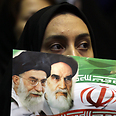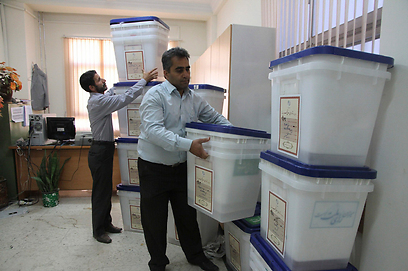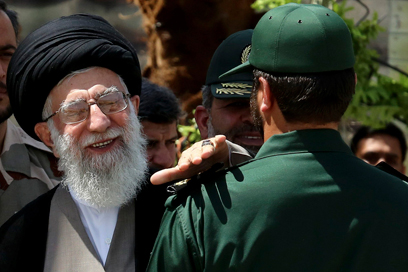
Iran's polls open in presidential vote
More than 50 million eligible voters go to polls to choose successor to President Mahmoud Ahmadinejad; Supreme Leader Khamenei urges large turnout
Iranians began voting on Friday to choose a successor to President Mahmoud Ahmadinejad, state television reported.
The election, in which voters have a choice of six candidates, is the first for a head of government since a disputed 2009 ballot touched off months of political unrest in the Islamic Republic.
Related stories:
- Iran's presidential elections: A guide
- Op-ed: Khamenei's dilemma
- Iranian candidate quits to boost reformist chances
More than 50 million eligible voters are choosing among the six candidates who remain in the race: a moderate, four conservatives and a hard-liner. All are loyal to Supreme Leader Ayatollah Ali Khamenei, who has final say on all state matters.
Khamenei urged a large turnout in presidential elections on Friday, and said he did not "give a damn" about US suggestions that the ballot was unfair.

Getting ballot boxes ready (Photo: Reuters)
"What is important is that everyone takes part," Khamenei said, speaking live on state television as he cast his ballot in the capital Tehran.
"Our dear nation should come (to vote) with excitement and liveliness, and know that the destiny of the country is in their hands and the happiness of the country depends on them."
Of five hardline candidates professing unwavering obedience to Khamenei, three are thought to stand any chance of winning the vote, or making it through to a second round run-off in a week's time.

Khamenei with member of Revolutionary Guard (Photo: AP)
Of those three main conservative hopefuls only one, current chief nuclear negotiator Saeed Jalili, advocates maintaining Iran's robust, ideologically-driven foreign policy.
The other two, Tehran mayor Mohammad Baqer Qalibaf and former foreign minister Ali Akbar Velayati, have pledged never to back away from pursuing Iran's nuclear program but have strongly criticised Jalili's inflexible negotiating stance.
They face a single moderate candidate, the only cleric in the race, Hassan Rowhani. Though very much an establishment figure, suspicious of the West, Rohani is more likely to pursue a conciliatory foreign policy.
AP and Reuters contributed to this report
- Receive Ynetnews updates directly to your desktop










